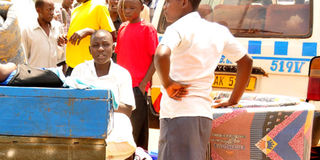Teach your child to protect their property at school

Students wait for transport back to school last year. Education experts say to teach children to be responsible requires that parents are responsible too. PHOTO BY MICHAEL KAKUMIRIZI
What you need to know:
- First, give them love by buying them a school bag they would love to carry around. Nambogo says, some parents simply buy bags yet children are not proud of carrying and handle them anyhow
- Avoid threats. Make it clear to your child that he has to follow certain rules, but explain them in a positive way, without threats or ultimatums.
Teaching children responsibility is a rule of the thumb for all parents. You definitely want to raise responsible children. One form of responsibility is teaching them early in life to never lose their property.
We are a few weeks into first term and the holidays of December, the worries of January and the rush for school requirements that openned the door for the burden of your child’s personal items. For many parents, it is already heartbreaking as children have already lost their water bottles, sweaters, jumpers, socks, shoes and books, among others. Chances of recovering any are in most cases nil. The solution for the parent is to replace the lost items. Tinah Nambogo, a reading teacher at Malcolm Pre-school in Kira, has seen parents struggle in the lost and found section to identify items that belong to their children. Surprisingly, the corner never gets dry of contents.
But there is opportunity for growth. To Nambogo, losing things is important in a child’s development. If properly handled, it could breed a responsible adult yet if mismanaged, a less vigilant future parent is sleeping in one of the rooms in your home.
Dealing with it
The sole responsibility falls on the shoulders of the parent. “You cannot expect your child who is in a playful stage to manage looking after their property. It calls for vigilance and letting them understand that it is their job to look after their belongings,” Nambogo explains.
Yet, she notes that some parents are too lazy to even label their children’s items such as school bags. “Parents must label items to make our work simple to identify and allocate them for their owners,” she says.
Helpful tips
First, give them love by buying them a school bag they would love to carry around. Nambogo says, some parents simply buy bags yet children are not proud of carrying and handle them anyhow. She tips parents to purchase a bag that is appropriate to their child’s size because an oversized bag keeps sagging and books may be cringed or some helpful items broken. A back pack is her preferred choice rather than those that are slung over the shoulder. For the younger ones, she recommends a water proof bag.
She thinks that it is a parent’s primary role to help their child know where they have put their items. If possible, she advises, parents to give their children a checklist.
Nambogo also thinks parents ought to make sure there is a natural consequence for losing something. It is a bit tricky but she suggests that replacing an item with their own money they have been saving, or going with them to buy another such that they miss playing with mates, or simply going without a sweater for a day or two if they have lost their new one. She advises against barking at children. “Naturally, most parents get mad when a child loses an item but it is more helpful to ask what would help them not to lose things than make them dispair when they have lost their stuff.”
Attach value
Relatedly, she say parents must always explain the value of things to their children.
Teach them how to look after their possessions in the same way you would teach them to cross the road. “Start by holding their hand, then teaching them how to do it, then you let them have a few practice runs while you are looking after them, and then finally you let them cross on their own,” explains Nambogo.
She says all this requires a parent’s involvement and not to leave such duties to house helps. “Young children cannot be expected to be responsible when they are little, but they can expect you to teach them responsibility. That is a job you cannot delegate to anyone,” she notes.
She stresses that getting things in life is not a fantasy. She cautions parents against bailing out children if they lose things. “Many parents are afraid to let children suffer, be sad or angry, but if we always solve children’s problems, they will not learn to be responsible.” She says if a child forgets her sports shoes at home, do not call them back or take them such that when they miss play, they feel the pain.
How to teach responsibility
Age-appropriate tasks. Think of something you know your child can do without too much difficulty and give him clear instructions about what you want him to do.
Show and tell. When you give your child a job to do, explain it in simple terms.
Avoid threats. Make it clear to your child that he has to follow certain rules, but explain them in a positive way, without threats or ultimatums.
Set a good example. Show your child what responsibility is by taking good care of your own things and your own space. Put your car keys where they belong instead of on the table.
Be realistic. Your child would not always put his shoes by the front door, or put his toys back in his box. If he is out of sorts, try not to get impatient.
Pour on the praise. Whenever your child tries to act responsibly, even if he does not succeed, give him plenty of praise and attention. This shows your child that his efforts are important and appreciated. babycentre.com




